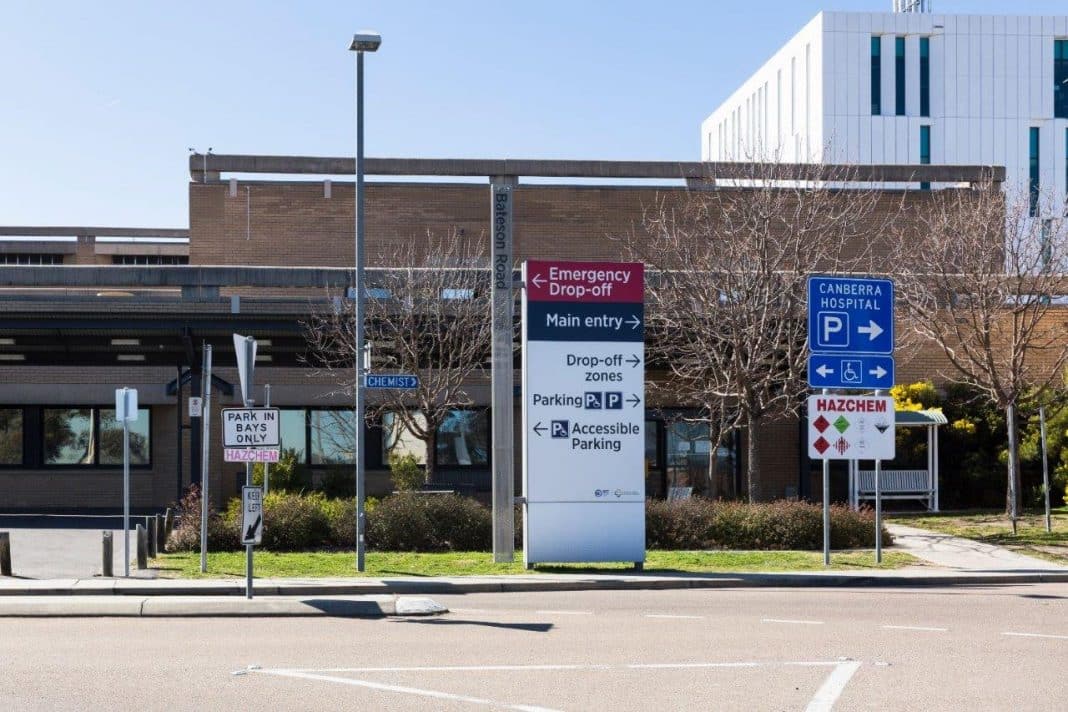Operation Reboot – the ACT Government’s $3.5 million plan to provide an additional 14,000 specialist outpatient appointments – did not meet its target; planning was ineffective; the prioritisation of rapid rollout over forward planning “compromised the effectiveness” of the project’s implementation; and monitoring and reporting arrangements were only partially effective.
Those are the findings of the Auditor-General’s performance audit report, published this week.
Canberra Health Services (CHS), however, has defended the initiative, while the Canberra Liberals see the findings as another failure by the government.
Auditor-General’s findings
The Auditor-General found that CHS achieved 6,132 additional outpatient appointments – only 43.8 per cent of the 14,000-appointment target. It spent 37.6 per cent ($1.3 million) of the budgeted $3.5 million.
“The target of 14,000 additional specialist outpatient appointments was derived from pre‐COVID‐19 data analysis that did not account for the impact of the early public health response to the pandemic, which was ostensibly the purpose of Operation Reboot,” the report stated.
“The prioritisation of rapid rollout over forward planning compromised the effectiveness of the implementation of Reboot (Outpatients). Reboot (Outpatients) was primarily predicated on the provision of additional appointments as the mechanism to address the wait lists, rather than potentially more sustainable measures to improve efficiency.”
CHS also expended “significant effort” on engaging external providers, “for very little return”, the report found. Only 585 patients (9.5 per cent of the additional appointments) were seen by external providers, compared with 5,547 patients (90.5 per cent) seen by internal providers.
The report found that the procurement approach to source external providers was significantly limited by a lack of documented assessment of expressions of interest; the engagement of providers without written expressions of interest; and (in one instance) the delivery of services without an agreed contract. “This compromises the integrity of patient service delivery arrangements.”
Furthermore, CHS did not develop a project management plan or risk management plan once the initiative began, the report stated. (Some aspects of how the initiative would be delivered were addressed in the early stages of implementation.)
“This approach provided little scope for CHS to effectively manage risks to successful delivery of additional outpatient appointments,” the report stated.
There was no budget or schedule of activities aligned to the initiative’s desired outcomes, nor roles and responsibilities for the initiative, the report also found. Several known risks – including limited access to clinic space, staffing, and COVID‐19 transmissions – ultimately affected the rollout. While CHS advised that it identified risks to achieving the stated targets, and known limitations to business‐as‐usual outpatient activity, the Auditor-General found that CHS’s consideration of these issues was not documented, and the risks “subsequently eventuated and impacted” the implementation of Reboot (Outpatients).
While the process to identify internal medical skills had some strengths – clinics developed new approaches to reduce wait lists, clinicians worked additional hours – the application process was “not used consistently”, and “lacked robust capacity planning (i.e. the approved targets did not have a clear basis)”.
Finally, monitoring and reporting arrangements were “partially effective”. “The Outpatient Transformation Steering Committee and Outpatient Transformation Working Group, responsible for internal oversight, benefited from access to a bespoke Reboot Dashboard which provided clear insights regarding the approximate number and source of additional appointments delivered. These bodies were well‐positioned to share information across clinical divisions, and did so in relation to early planning, implementation challenges and lessons learned. However, these oversight bodies were large, with many members, and not suited to rapid project‐related decision‐making.”
Canberra Health Services
CHS said that it would use the audit to better plan emergency responses and manage projects.
“There are important operational lessons for Canberra Health Services as a result of this audit,” a spokesperson said. “Specifically, these relate to Canberra Health Services’ planning for future emergency response scenarios as well as project management more broadly.
“Canberra Health Services will take the audit’s recommendations on board, with improving access to outpatient care already a strategic priority for the organisation. These complement CHS’ own analysis following the completion of the program, which is acknowledged by the Auditor-General.”
CHS said that the shortfall in meeting the target was due to extra work at a challenging time.
“The ACT government responded quickly to the impact of the COVID-19 pandemic on its outpatients by providing telehealth appointments where appropriate for patients,” the spokesperson said. “However, the need for social distancing meant many non-urgent appointments were postponed in 2020, especially during the period between March and June 2020.
“To address this, the ACT government made a significant commitment to fund additional outpatient appointments as part of its broader Operation Reboot initiative.
“As a result of this initiative, an additional 6,132 outpatient appointments were achieved. Although the target was for 14,000, this result demonstrates the significant amount of additional work that was undertaken during a time of substantial pressure on the public health system …
“It is important not to underestimate just how challenging the COVID-19 environment was in the peak of the pandemic, despite there being no outbreaks in the ACT for an extended period, and the impact this had on the operation of our health services. We would like to thank all the staff who worked so hard during COVID-19 to provide care for our community.”
Canberra Liberals
Leanne Castley MLA, shadow minister for health, said: “It is disappointing but not surprising that the health minister [Rachel Stephen-Smith] announced this initiative as a way to fast track recovery in our public health system, only to fall well short of what was promised.
“It is also concerning that this announcement was made to Canberrans promising to get back on top of the increasing number of overdue outpatients, yet CHS only managed to spend 40 per cent of the amount budgeted.
“This again goes to show that the health minister’s track record is promising things, trying to rush them through and then significantly under-delivering. “It is extremely disappointing that this government continues to make big promises, only to consistently fail or under-deliver.”



